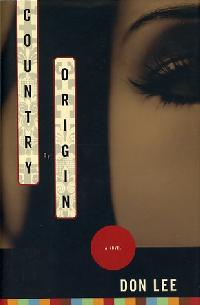Tracking down the past
In search of an elusive identity
By Mark Schreiber
A version of this review appeared as
"Tracking down the past: In search of an elusive identity" in
The Japan Times, The Asian Bookshelf, 19 September 2004
Don Lee, Country of Origin, 2004
Sujata Massey, The Pearl Diver, 2004
One formula frequently applied to the mystery novel involves adoptees who reach adulthood and seek to track down their birth parents. This understandably can create problems for people who don't wish to be found, and sometimes their efforts at evasion lead to murder. The master of this genre was the late Canadian-American author Kenneth Millar (1915-1983), who wrote under the nom de plume of Ross MacDonald.
The two works received here involve the search for identity by the grownup daughters of black U.S. servicemen and Asian mothers. Read together they give some interesting insights into how two writers can adopt very different approaches.

See another review of Country of Origin by William Wetherall. Don Lee Although set in 1980, Country of Origin seems to have borrowed a cue from a recent true crime -- the case of former British Airways stewardess Lucie Blackman, who was fatally drugged in July 2000 while dating a customer of the Roppongi club where she worked. Multiple characters . . .After beginning on a similarly violent note, author Lee weaves together several parallel stories involving the murder victim, an Asian-American named Lisa Countryman; Tom Hurley, the U.S. embassy official assigned to her case; and Kenzo Ota, the bumbling Japanese cop who liaises with the embassy in the search for the missing woman. Each major character sustains his own sub-story. Hurley, in the midst of a tepid affair with the wife of a CIA officer, is involved in a hit-and-run accident; Ota, a skittish insomniac who is treated with contempt by his police colleagues, coincidentally discovers his ex-wife had gone to the United States, remarried and returned to Tokyo with a pudgy, obnoxious son who Ota is convinced must be his own. . . . none appealingLee, who describes himself as "third-generation Korean American," manages to splice on some material about the lowly status of Koreans in Japan that seems unrelated to the plot. Until the story finally gets sorted out, it lacks a single character with any appealing qualities. The victim herself -- who came to Japan in search of a mother she never knew -- is unable to form lasting friendships, and those searching for her prove, by turns, to be self-serving, duplicitous, corrupt, manipulative and generally unappealing. The late novelist Ross Thomas (1926-1995) had a penchant for creating agreeable rogues, one that Lee would do well to emulate. The lack of a likable protagonist is the most serious flaw in this otherwise well written and carefully researched book. |

Sujata Massey Two books back, Sujata Massey's amateur sleuth, Japanese-American antique expert Rei Shimura, had been deported from Japan for getting underfoot while a crime was under investigation. Now engaged to her lawyer beau Hugh and settled in Washington, D.C., she's landed an order to decorate a new Japanese restaurant. Murder or suicide?Andrea, the restaurant's serving hostess, turns out to be the daughter of a black U.S. serviceman and a Japanese woman who disappeared from their home in Virginia shortly after Andrea was born. Did her mother, unable to adjust to life in the U.S., commit suicide? Or was she murdered, perhaps so that her father could remarry? Shimura, enlisted in the search for Andrea's mother, seems to be closing in when she suddenly finds herself whisked away in the trunk of an abductor's car. Even after this close call she refuses to halt her investigation, which leads her to her estrangement from Hugh. Kinder, gentler crimesThe exploits of Massey's feisty female character are supported by good research -- particularly the interesting insights into the dog-eat-dog world of Washington politicians and the restaurants they frequent. On the other hand her books tend to feature kinder, gentler crimes that make them more appealing to female readers. Massey's character's deportation from Japan and move to D.C. is analogous to her own departure from Japan several years ago. Thus for both the writer and her character, the ties to Japan seem to be fading farther from view with each successive work. If her series is to be prolonged, a refresher visit may be in order. |